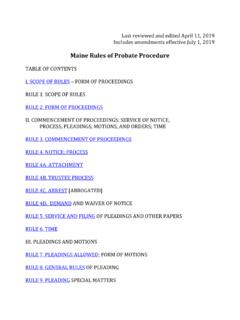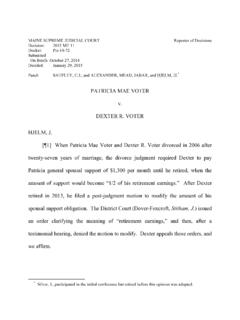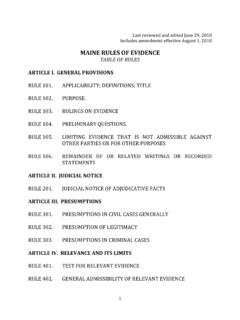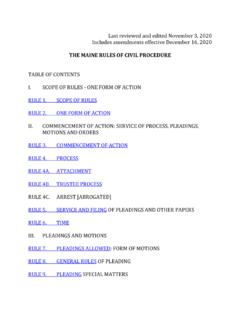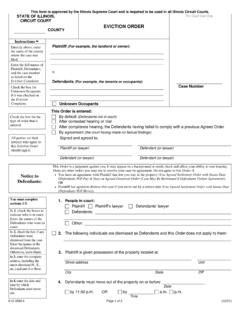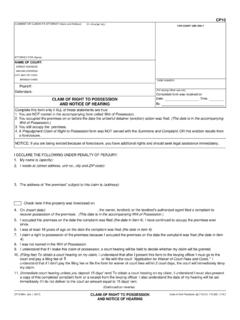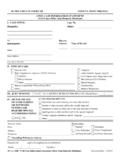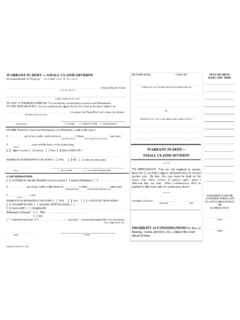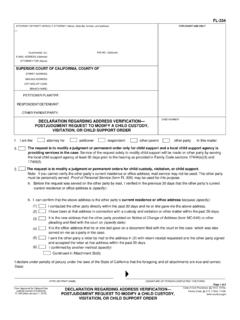Transcription of A GUIDE TO SMALL CLAIMS CASES - Maine
1 A GUIDE TO SMALL CLAIMS CASES State of Maine Judicial Branch Published by Administrative Office of the Courts 1 Court Street, Suite 301 Augusta, Maine 04330 Edited and Revised November 2016 Important disclaimer: The specific requirements concerning your case are contained in the statutes, rules, and administrative orders. This is only a GUIDE . List of selected SMALL CLAIMS forms available from the District Court Blank SMALL CLAIMS forms are available from any clerk s office or on the Maine Judicial Branch website: Administrative Order JB-05-26 lists current filing fees. A link to this order can be found at: You may also contact the clerk s office for filing fee information. If you cannot afford to pay filing fees, you may request a waiver from the court by submitting form CV-067, Application to Proceed without Payment of Fees. SC-001 Statement of Claim ( plaintiff ) (starts the case) SC-005 Notice of Service of Statement of Claim ( plaintiff ) (serve by mail on the defendant ) SC-006 Affidavit and Request for Service (for plaintiffs filing fewer than three (3) SMALL CLAIMS CASES per month, service by clerk) Post-judgment forms (appeals, disclosure hearing, or settlement-related) SC-007 Notice of Appeal ( plaintiff or defendant ) CV/CR-165 Transcript and Audio Order Form ( plaintiff or defendant , if applicable) SC-003 Request for Disclosure Hearing ( plaintiff /judgment creditor, if filing less than three (3) SMALL CLAIMS CASES per month, option to request service by clerk) SC-004 Notice of Disclosure Hearing (any plaintiff /judgment creditor may use.)
2 Those filing three (3) or more SMALL CLAIMS CASES per month must use this form and provide for service on defendant /judgment debtor directly) SC-005 Notice of Service of Disclosure Hearing ( plaintiff ) (serve by mail on the defendant ) (same form as the one used in serving the Statement of Claim) SC-006 Affidavit and Request for Service on the defendant (for plaintiffs filing less than three (3) SMALL CLAIMS CASES per month, service by clerk) (same form for Statement of Claim and disclosure hearing) MJ-SC-001 Affidavit and Agreement ( defendant /judgment debtor s agreement to make installment payments) (use form MJ-SC-012 for business entities) MJ-002 Request for Civil Order of Arrest or Order for Appearance ( plaintiff /judgment creditor, if the defendant /judgment debtor fails to come to court for a disclosure hearing) MJ-015 Motion, Affidavit and Order to to Provide Employment Information ( plaintiff /judgment creditor, if the defendant /judgment debtor has failed to make two or more installment payments ordered by the court MJ-SC-005 Motion for Contempt ( plaintiff /judgment creditor, if the defendant /judgment debtor fails to appear or otherwise comply with a court order) MJ-009 Motion and Affidavit for Order to Withhold & Deliver (for the plaintiff /judgment creditor, if the defendant /judgment debtor fails to make two or more installment payments, request for court to order employer to withhold wages) In addition to filing fees, the plaintiff /judgment creditor is responsible for paying for service on the defendant /judgment debtor.
3 I Table of Contents 1 What is SMALL CLAIMS court? .. 1 SMALL CLAIMS court forms and clerk s office assistance .. 2 Maine statutes and rules that apply to SMALL CLAIMS CASES .. 2 Ensuring access to justice .. 2 Important disclaimer: this is only a 3 Part A Overview of SMALL CLAIMS court .. 4 1. When to consider using SMALL CLAIMS court .. 4 2. Examples of SMALL CLAIMS CASES .. 4 3. Is SMALL CLAIMS court the best option for resolving the dispute? .. 5 4. Do you need to hire an attorney? .. 6 5. Can someone other than an attorney represent you in a SMALL CLAIMS case? .. 6 Part B Steps in a SMALL CLAIMS case: Statement of Claim through judgment .. 7 Complete a Statement of Claim .. 7 2. Determine in which District Court the case should be filed .. 7 3. Use the defendant s correct name and address .. 8 4. Provide notice of the case to the defendant (service) .. 8 5. File the Statement of Claim and receive the hearing date from the clerk s office .. 10 6. Recording the hearing.
4 10 7. What should the defendant do after receiving the Statement of Claim? .. 10 8. What parties should expect when going to court for the hearing .. 11 9. How to prepare your claim or defense at the hearing .. 12 10. How to request a postponement of the hearing .. 14 11. Mediation .. 15 12. Judgment .. 15 Part C After judgment: information for creditors and debtors .. 17 1. Appeals .. 17 2. If the debtor does not appeal .. 17 3. Requesting a disclosure hearing .. 18 4. Prepare for the disclosure hearing .. 19 5. Conducting a disclosure hearing .. 20 6. What relief against a debtor can be included in a disclosure hearing order? .. 20 7. If the debtor fails to appear for a disclosure hearing .. 21 8. What can happen if a debtor does not comply with a disclosure hearing order .. 22 9. What income and property of the debtor is exempt from a judgment? .. 22 10. Transfer to another District 23 11. If the creditor fails to appear for a disclosure hearing .. 23 12. If the debtor pays the judgment in 24 Definition of Key Terms.
5 25 Appendix A: Maine District Courts .. 31 Appendix B: Sheriffs Offices .. 33 Introduction What is SMALL CLAIMS court? SMALL CLAIMS court provides a speedy and inexpensive way to resolve disputes when the plaintiff s claim is $6,000 or less. CASES are heard and decided in Maine District Court by a judge without a jury. This GUIDE explains how to file or respond to a SMALL CLAIMS case and what can happen if you are on the winning or losing side. For plaintiffs (the person filing the case), the GUIDE walks you through the process of starting the case through judgment, and the steps that may be required after judgment to collect. For defendants (the person against whom the case has been brought), the GUIDE tells you how to respond to a case, and why it is crucial for you to do so. A key message for defendants is: if you are sued in SMALL CLAIMS court, do not ignore the case. The GUIDE is not legal advice or a substitute for getting legal or advocacy help.
6 An attorney may help evaluate the strengths and weaknesses of your case, if you are a plaintiff , or possible defenses, if you are a defendant . Both sides can choose to represent themselves in a SMALL CLAIMS court case, or can hire attorneys. Even if you decide to represent yourself, you may find it very helpful to get legal advice before going to court. Free and low cost legal assistance and consumer protection resources are listed on the back cover of the GUIDE . These resources may be especially helpful for parties involved in credit card or other consumer debt CASES . Although the SMALL CLAIMS process is a simple and informal court process to provide relief for disputes concerning money, it still requires court resources, and should therefore be used only when really necessary. Depending upon the facts of the case, an out-of-court settlement may save time, effort, and money for both sides. In some kinds of consumer disputes, the Maine Attorney General s Consumer Mediation Service may be helpful in resolving the dispute.
7 See Part for more information on this. In addition, if a SMALL CLAIMS case is filed, the parties may have the chance to resolve the dispute by mediation through the Judicial Branch s Court Alternative Dispute Resolution Service (CADRES) before the hearing is held. See Part for more information on mediation. Both services are free. Why are certain words in bold? A fuller explanation of legal terms can be found in the Definition of Key Terms section at the end of this GUIDE . 2 SMALL CLAIMS court forms and clerk s office assistance The District Court has forms that must be used in all SMALL CLAIMS CASES . A checklist of many of the most frequently used forms can be found on the inside front cover of the GUIDE . You can get blank forms from any District Court clerk s office at no cost. Forms are also available on the Maine Judicial Branch website at: Many of these forms can be filled out on a computer and then printed.
8 If you do not have access to a computer or printer, you can go to a library with public computer access and ask the librarian to help you find the forms. A list of public libraries can be found at: Court clerks can answer questions about the SMALL CLAIMS court process, including scheduling. Clerks and other court employees cannot, however, tell you what to put in forms, or give legal advice. For legal assistance and consumer protection resources, see the back cover of the GUIDE . Maine statutes and rules that apply to SMALL CLAIMS CASES The Supreme Judicial Court has adopted rules that say how SMALL CLAIMS CASES will be handled (the Maine Rules of SMALL CLAIMS Procedure or SMALL CLAIMS Rules ). You can find these rules on the Maine Judicial Branch website at: In addition, the following sections of the Maine Revised Statutes may also apply to SMALL CLAIMS CASES : Title 14, Sections 7481-7487 ( SMALL CLAIMS ); and Title 14, Sections 3120-3136 (Enforcement of Money Judgments).
9 The Maine Revised Statutes are available online at: Hard copies of the statutes and rules are also available at law libraries. For locations, go to: Ensuring access to justice To help people with limited English proficiency use Maine courts effectively, parties who need the assistance of an interpreter may request assistance at the clerk s office in any District Court. All Maine courts have interpreters available by telephone at the clerk s office. 3 For more information on interpreter services see: maine_courts/admin/interpreters. Assistance is also available for individuals with disabilities. To request a reasonable accommodation in a SMALL CLAIMS case, contact the clerk in the District Court where the case is filed, or submit an Accommodation Request Form. A link to this form, and more information concerning accessibility and interpreters, is available on the Maine Judicial Branch website at: Important disclaimer: this is only a GUIDE The specific requirements concerning your case are contained in statutes, rules, and administrative orders.
10 Representing yourself in court can be challenging. This GUIDE was developed to assist non-lawyers. To make the GUIDE more readable, some sections of the statutes, rules or administrative orders referred to have been shortened or summarized. While every effort has been made to ensure that the information presented is accurate, comprehensive, and clear, if there is any conflict between the law and this GUIDE , the law controls. Readers should therefore not rely on the GUIDE for the final word on the requirements of the applicable laws. In addition, the GUIDE describes the general procedures and requirements of the laws that apply to SMALL CLAIMS CASES . The court s decision in individual CASES will take into consideration the specific facts and circumstances of each case. 4 Part A Overview of SMALL CLAIMS court 1. When to consider using SMALL CLAIMS court You may use SMALL CLAIMS court if: Your claim is $6,000 or less, excluding court costs and post-judgment interest, and you want to use the simple and informal process of SMALL CLAIMS court.
